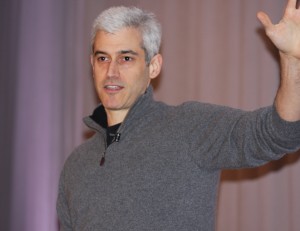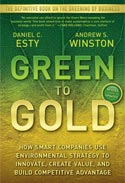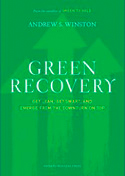30 Jan There is no alternative: an intererview with eco-economist Andrew Winston – The Joy Trip Project
Podcast: Play in new window | Download | Embed
Subscribe: Apple Podcasts | Spotify | Email | RSS | More
 For companies in the Outdoor Industry day-to-day operations that protect and preserve the environment naturally make good sense. So-called green business practices are meant to be sustainable, using a minimum amount energy and mostly renewable resources to create the products and services that drive our economy.
For companies in the Outdoor Industry day-to-day operations that protect and preserve the environment naturally make good sense. So-called green business practices are meant to be sustainable, using a minimum amount energy and mostly renewable resources to create the products and services that drive our economy.
And for Andrew Winston it’s become abundantly clear that despite any political and social ideology that espouses the virtues of capitalism above all else green technology in commercial manufacturing and production is the best way to for businesses of every variety to assure their long-term profitability and prosperity. Having begun his career as a traditional business consultant Winston said he started taking a closer look into how business and the environment might work together.
Winston:
So I went back to school for an environmental management degree and decided that I wanted to marry business and the environment and figure out how to combine my business background and what was just an interest and passion about resource use, what the foundations of business really are, which is stuff and material and how we’re using too much of it. So it came from a place of practicality and profitability almost, even more than traditional quote tree hugging. That was just about business can’t survive like this. And that means our society can’t.
The author of two books Green to Gold and Green Recovery Andrew Winston was the keynote speaker at the biannual  breakfast meeting of the Outdoor Industry Association at the Outdoor Retailer Winter Market in Salt Lake City Utah. There he shared with an audience of true believers his view on the importance of sustainability in business and why in the long run really there is no alternative.
breakfast meeting of the Outdoor Industry Association at the Outdoor Retailer Winter Market in Salt Lake City Utah. There he shared with an audience of true believers his view on the importance of sustainability in business and why in the long run really there is no alternative.
JTP:
One of the things I find fascinating about your conversation is that you talk about issues, especially issues that you describe as “TINA Issues” And that stands for “There Is No alternative”. What are a few examples of these TINA issues? And what do they mean when it comes to reducing sustainability costs?
Winston:
 Tina I’m really using in the broadest since. In dealing with climate change, dealing with biodiversity loss, dealing with waste, there is no alternative. We don’t have a choice any more for a lot of reasons and the forces driving that include just increased resource cost and reduced resource availability as the number of people on the planet who are getting richer grows. There’s just not enough stuff. That’s sort of the obvious one. But there’s also transparency, the technology driven demand for knowing what’s in everything. And so this just opens up companies and they have to start talking about what they’re doing. And that means they actually have to start changing what they’re doing. You can’t be transparent about a process that they you don’t want to be a transparent about. So it means that you start changing products, what’s in it? Who made it? Where was it made? Were they paid a living wage? These things start being open to the world. So there is no choice. You can’t compete in a world where your customers, especially big business customers won’t put your products on the shelf if they don’t have the data, if they don’t know how it was made.
Tina I’m really using in the broadest since. In dealing with climate change, dealing with biodiversity loss, dealing with waste, there is no alternative. We don’t have a choice any more for a lot of reasons and the forces driving that include just increased resource cost and reduced resource availability as the number of people on the planet who are getting richer grows. There’s just not enough stuff. That’s sort of the obvious one. But there’s also transparency, the technology driven demand for knowing what’s in everything. And so this just opens up companies and they have to start talking about what they’re doing. And that means they actually have to start changing what they’re doing. You can’t be transparent about a process that they you don’t want to be a transparent about. So it means that you start changing products, what’s in it? Who made it? Where was it made? Were they paid a living wage? These things start being open to the world. So there is no choice. You can’t compete in a world where your customers, especially big business customers won’t put your products on the shelf if they don’t have the data, if they don’t know how it was made.
JTP:
And you refer to certain technologies that allow consumers to very quickly and easily determine how much of an impact these particular products have. But you also said that we’re a point right now where green will always be small because people aren’t prepared to pay for something that is just green. If that’s the case, at what point do we shift our thinking to such a way that we will go to a sustainable product as opposed to something that’s just green.
Winston:
Well, let me clarify that. What I said was the number people who pay more just for green with remain small. And that’s partly out of just ability to. Not everybody can afford to buy organic food or a more expensive car that has the hybrid or electric engine. So there has to be a more complete value story told by products and that might mean that we develop products that don’t have trade-offs, that don’t cost more. That’s what you see companies starting to do. What is becoming a vast majority of people is those that do want it all, those who are conflicted about it, that care about where their products came from and who made them and want for the same price and quality the greener more sustainable option. And so that is growing to nearly everybody. So that is another one of those TINA things. You can’t not play in this arena if you’re a company putting out a product or a service, because everybody is going to be looking for those dimensions. And it’s a tiebreaker in so many ways. And so I think the difference between green and sustainable is a semantic one in a lot of ways. You know I think sustainable encompasses probably a little more social issues, labor, than what people usually mean by green. By people use them pretty much interchangeably a lot of the time.
JTP:
And I think that some people in the business community shy away from green because it sounds like its expensive. It sounds like it’s irrelevant to their bottom-line. But you make the point that green is actually good business. Exactly how do we as business people determine that green makes good sense from a production standpoint and also from a retail sales standpoint?
Winston:
At its core, the most simplistic view green is about doing more with less. As one CEO said to me, without getting into climate change or taking a stand on it he said, “Isn’t better to produce less carbon than more?” It just costs less. Anything that isn’t used in a product, any thing that’s pollution is waste. That’s expense. This is really basic stuff in a lot of ways. Getting lean to save money and save it quickly, in things like…We’re discovering the inefficiencies in our system, in our buildings in our distribution are vast and we’re finding massive savings and very quick paybacks. And that’s just straight business value. That’s even including all the softer intangible value that does matter to the value of business, employee loyalty, customer loyalty, walking the talk, doing the right thing, these things that attract, especially the next generation, of workers and consumers and enable you to tell stories about where your products come from. So it’s good business because it’s getting incredibly expensive to not do this. I think that’s become very clear to companies. And again, going back to just resource prices, just the inputs. As I mentioned in my talk, Coca-Cola had spent $800 million more last year on corn for their products because the cost of everything is basically going up, fundamentally going up. So if you don’t figure out how to do things with far less stuff you’re just going to get priced out. It’s going to be too expensive for you to operate.
JTP:
You describe the importance of companies becoming lean, smart, creative and engaged. And through the course of all that you’re also recommending exercising just good business practices. It sounds to me like you’re pretty optimistic with some degree of recovery. Is that accurate in my assumption?
Winston:
Optimism is a tough one. I made that my New Year’s resolution this, was to be optimistic. I think you need to be optimistic in the longer run. I think the short run is harder. I mean we’re heading in the wrong direction on most metrics. But you don’t hear a large company in the world any more completely dismissing sustainability because again, they’re seeing their input prices rise. They’re hearing the questions from their customers, from their employees. There is no alternative, right? There’s no choice. The number of companies that I think see how deep the change needs to be or how fast things are going to change I think that number is still very small. So I’m optimistic in the long run yes, that we’re going to get this and we’re going to get it, right? And the world’s moving to a green technology. I mean the electrical grid will be mostly renewable based at some point. It’s a matter of how fast. You know? The economics on that will win out and it will be cheaper. Fundamentally it’s already getting cheaper in many areas to use solar or to use wind or do these kinds of things. So that’s going to be the cheaper option. It’s just a matter of is it fast enough to stave off some of the worst problems we may face.
JTP:
You started your conversation with the issues of politicizing the green economy and green issues. This is a question that just occurs to me but I’m curious to know if you can speak to this with regard to the production of fossil fuels and having fossil fuels be the core if not the basis of our entire economy. Is it possible to make a shift to a more green-based sustainable system and forgo our petroleum-based system in a quick and easy manner?
Winston:
Well like I said, we will get there. The economics are already starting to win out because again I’m fairly simplistic about economic on things like this. Renewable energy has zero variable cost. Meaning, once you’ve got it on your house, on your building, get the wind farm up, it doesn’t cost anything to get fuel. That’s not true of fossil fuels. You’ve got to dig it out, you have to mine it, you got to refine it. Over time, zero cost will win. There’s upfront costs. There’s technology. We have to bring down the cost as we get to scale. But that’s happening very, very quickly. The cost of solar is down two-thirds or so in the last four or five years. I mean it is coming down very quickly. The quick and easy part is where the political stuff comes in. The industries that are still fossil fuel-based, the industries that are producing those, they have a lot of power and they’re sitting on a lot of assets. There’s also two different questions here. There’s the electric grid and there’s mobile sources, you know cars. And those are two very different conversations. You know coal is the issue on the grid and oil is the issue on mobile sources. They have very different challenges and economic models and reasons for moving away from them at whatever pace. I think we’ll move away from coal fairly quickly. Natural gas is turning into a pretty viable and good solution as an interim fuel. And then we’ll get to mostly renewables on the grid. It’s going to take some time, but we’re going that way there are countries like Germany that have said, we’re going to be 100 percent renewable and they’re going there, fast.
JTP:
You said that the economics will win out. At the end of the day what can we most look forward to in this most successful paradigm?
Winston:
It’s an interesting question because what we often do or forget to do in sustainability discussions is paint the picture of a better world. It’s easy to get into the doom and gloom and say, “if we don’t do this” we’re going to have all these problems, quality of life is going to drop. But to remind people, every time we’ve cleaned the air, for example, that’s been kind of the clearest kind of set of regulations around the world for the last 40 years, people get healthier. There’re few dying of asthma and coughing. We sort of forget, we take for granted almost how much healthier we are when we clean the environment. When we produce things using methods that’s much cleaner, that there’s a healthier better life ahead of us that is longer lasting, that is easier to live, that is cheaper. This is the part that is harder to convince people of. It’s actually cheaper. I now have solar panels on my house. They will take a while to pay off, but they will pay off for many, many years and I will get energy for free. Every day that it’s sunny that’s cheaper. It’s a better an inexpensive way of living. We don’t often paint a picture of how much better our life will be in the future, in a cleaner more stable, not reliant upon fuel from a dangerous part of the world kind of way. That’s a better life
Andrew Winston is an international authority on sustainable business practices. You can learn more about his work and finding the gold in green online at AndrewWinston.com
Music this week by Jake Shimabukuro
The Joy Trip Project is made possible with the support of sponsor Patagonia. Check their latest conservation and new media initiatives on their blog the cleanestline.com. Additional support is also provided by the Outdoor Retailer Winter Market. Discover new technologies, products and services for your next great adventure all under one big tent. Visit Outdoor Retailer.com
![]()
![]()
Thanks for listening. But you know I want hear from you. So please drop me a note with your questions comments and criticism to info@joytripproject.com. Until next time take care.



You must be logged in to post a comment.